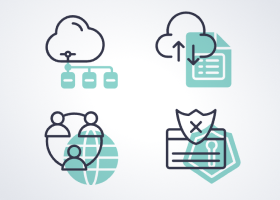Secure Cloud Storage for Business
What Are Cloud Storage Services?
Cloud storage services allow organizations to store data offsite securely. With a cloud file server for business offerings, data is stored in third-party data centers. A cloud file server for business not only moves storage off premises, but also leverages third-party resources to handle all systems management required to keep data safe and accessible for authorized users. This relieves the burden of procuring and maintaining physical data storage space and solutions.
A cloud file server for business provides centralized storage and workspace to give users ready access to data and the ability to share files and collaborate from any location on any connected device. Unlike traditional file servers, a cloud file server for business offers advanced features for sharing files in the cloud and secure remote access and usually communicates over standard HTTPS protocols.

Visualization is used to run a cloud file server for business. The space and resources of servers are collected and pooled into a virtual environment that is hosted by a service provider and made accessible to users over a network. To ensure that only authorized users can access a cloud file server for business, users are authenticated using cloud identity services and by enforcing a permission structure to grant rights (e.g., view, read, write) for specific files and individual folders.
Cloud File Server for Business Use Cases
A cloud file server for business gives organizations the flexibility to support and integrate with existing applications as well as an easy way to deploy, manage, and maintain files. Common use cases for a cloud file server for business are as follows.
Content management
A content management system (CMS) can use a cloud file server for business to support its ability to serve up content with multiple servers having access to the same set of files.
Home directories
A cloud file server for business can be used to support home directories with files only accessible by specific users and groups. The scalability and cost benefits of a cloud file server for business make it a good solution for extending access to home directories for many users.
Media and entertainment
Continually changing digital media and entertainment workflows benefit from a cloud file server, because of its flexibility, scalability and ability to provide consistent, secure access to information.
Web serving
A cloud file server for business provides the shared access needed to support web-serving applications. Because environments are virtualized, it is easy to support the requirement for web servers to have access to the same set of files.
How to Choose the Right Cloud Storage Provider
An ideal cloud file server for business solution should:
- Comply with recognized industry standards and quality frameworks
- Be fully managed
- Deliver reliable throughput and low-latency performance
- Have redundancy across multiple sites
- Include network security and access control permissions
- Meet uptime requirements
- Offer scalable storage space
- Provide seamless integration with existing applications
Other considerations when evaluating options for a cloud file server for business include the following.
- Are there branding and customization options?
- Can users secure access files from any device?
- Does it provide fast access to data?
- How are security and privacy handled?
- Is central administration and reporting available?
- What are the online sharing capabilities?
- What is the ROI?
Security Concerns with Cloud Storage Services
A cloud file server for business has vulnerabilities and can only be effectively protected when these are understood and addressed with proper security and protective measures. The following are commonly cited cloud file server for business risks.
Advanced persistent threats (APTs)
Hackers and organized crime groups are notorious for creating and using advanced persistent threats (APT) to attack a cloud file server for business.
API vulnerabilities
Cloud file server for business service providers commonly expose their application programming interfaces (APIs) to users so that they can interact with their systems. While this access is necessary to allow applications and databases to work together seamlessly, it can become an attack vector. APIs create loopholes that can be exploited by cyber attackers when they are misconfigured or overexposed.
DDoS attacks
Distributed denial of service (DDoS) attacks are a significant threat to a cloud file server for business. Even if the DDoS attack does not result in data loss or damage, the disruption of service can be devastating, as operations can come to a halt when information resources are inaccessible.
Insecure third-party apps
A vulnerability in even a single third-party application or resource can put a cloud file server for business at risk.
Lack of physical control
When organizations use a cloud file server for business, they put their data in the remote servers of service providers. This means they lose control of securing the physical infrastructure and must rely on the service provider to ensure that systems and data are safe from theft or damage. For some users of a cloud file server for business, this loss of control over physical security stirs concerns about data privacy and integrity.
Malicious insiders
While external threats are a major concern for cloud file server for business security, malicious insiders are also a problem. It only takes one insider with access to breach a cloud file server for business. Malicious insiders can be former or current employees, contractors, or partners who illegally use their access and credentials to steal information, cause damage, disrupt service, or launch a ransomware attack.
Misconfigured cloud
Cloud file server for business misconfigurations are, by far, one of the biggest security issues. Causes for Some causes of misconfigurations of a cloud file server are:
- Changes to user interfaces
- Data storage without encryption
- Default credentials and settings left unchanged
- Excessive cloud access permissions
- Failure to install security updates or patches
- Human error
- Lack of awareness about specific security policies
- Lack of security skills and resources
- Overly complex deployments and policies
- Poor key/password management
- Shadow IT or unauthorized deployments
- Standard security controls disabled
- Use of publicly accessible storage elements
Multi-tenancy
If a cloud file server for business is deployed in a multi-tenant environment, companies share resources with other organizations. While this reduces costs and optimizes the use of resources, weak tenant separation or vulnerabilities in the shared cloud file server for business environments can create risk. It only takes a single flaw in one shared application or a misconfiguration of one user’s system to create an opening for a cyber attack.
Poor data governance
A lack of data governance can introduce vulnerabilities for a cloud file server for business. Issues related to poor data governance range from theft caused by a lack of encryption to loss due to files getting lost because file naming conventions were not used. Other issues arise from data being overexposed due to a lack of segregation of duties and over-provisioning access.
System vulnerabilities
A cloud file server for business can have bugs or other system vulnerabilities that are overlooked or introduced with system updates. This puts data at risk, because attackers are always on the lookout for ways to infiltrate cloud deployments to access data, compromise data integrity and privacy, disrupt service, or introduce malware. The four main categories of cloud file server for business system vulnerabilities are:
- Zero-day threats or newly discovered vulnerabilities for which a security patch is not available
- Configuration-based vulnerabilities caused by errors in the cloud’s default settings
- Weak or default credentials
- Lack of robust authentication systems
Compliance risks
Compliance is a growing issue for cloud file server for business systems. The rules for data protection, data sovereignty, and data localization have become more stringent. Organizations must follow specific rules about where and how data is stored, processed, and used to adhere to regulations. Because a cloud file server for business is managed and maintained by a service provider, organizations wholly rely on them to ensure that systems meet the requirements. This can open organizations up to significant risk as the penalties for noncompliance get increasingly more severe.
What Are the Benefits of Cloud Storage?
Enhanced scalability
Scalability is a significant benefit of a cloud file server for business. As requirements demand more or less data storage, a cloud file server for business can be scaled to meet the new needs. The ease of scalability makes it easy for organizations to start with a small deployment to test systems and work out processes, then increase capacity to accommodate all data stored in on-premises data storage systems. The flexibility that comes with easy scalability is also helpful in terms of being ready to support a rapid increase or decrease in users.
Enterprise-grade security
It is nearly impossible for on-premises systems to match the security a cloud file server provides for business delivered through a service provider. A cloud file server for business benefits from economies of scale, making it possible to have the best available security solutions and multiple layers of redundancy and control. Data is stored on multiple servers, meaning there is no single point of failure.
In addition, data stored in a cloud file server for business is free from the risk of any on-premise equipment being stolen or damaged. In addition, the service provider that manages a cloud file server for business ensures that all systems are kept up to date with the latest version of software and patches installed.
Guaranteed uptime
Unlike on-premises systems, a cloud file server for business comes with service-level agreements that guarantee uptime.
Improved cost efficiency
A cloud file server for business is very appealing from a financial perspective. It offers a much more affordable alternative to traditional on-premises data storage and portable hard drives. In addition to eliminating the need to buy expensive equipment to store data, a cloud file server for business does not require acquiring physical space to house the systems. A cloud file server for business also removes the requirement for dedicated IT experts to handle the management and maintenance of file storage systems. A cloud file server for business can be taken off by a service provider whose IT expenses are spread across all of their clients, making it less expensive for the organization.
Increased availability
With a cloud file server for business, data can be quickly, easily, and securely accessed remotely.
Data stored in a cloud file server for business can be accessed at any time from anywhere and by anyone with the appropriate authorization and credentials. This capability supports not just employees who are traveling or working remotely, but also makes it easy to share files with partners and other third parties safely. In addition, because files are stored centrally, they are always up to date, so users are assured that they are using the most recent version.
More robust collaboration
Collaboration is a key benefit of a cloud file server for business. With a cloud file server for business, users can collaborate on documents in real-time. Rather than relying on email to pass a document from one person to another and manage tedious versioning, entire teams are able to make changes to a single document simultaneously and be assured that nothing is lost. This is because a cloud file server for business stores content remotely in the cloud. With a cloud file server for business, users can also:
- Access, view, and edit the same files
- Ensure that changes are synced and saved
- Facilitate work between teams in different time zones
- Have edits be visible to users or groups as they are made
- Leave comments on shared files to share ideas or suggestions
- Receive notifications when files are edited or updated in real-time
- Share and edit large files, like video or audio files, with ease
- Work together and achieve shared goals, even with remote members
Simplified compliance
Rather than requiring organizations to stay on top of the latest changes to regulations and standards, a cloud file server for business puts this burden on service providers. With a cloud file server for business, systems are updated to ensure that they adhere to compliance requirements, such as Payment Card Industry Data Security Standard (PCI DSS), Health Insurance Portability and Accountability Act (HIPAA), Federal Information Security Management Act (FISMA), Sarbanes-Oxley Act (SOX), EU's General Data Protection Regulation (GDPR) and the California Consumer Privacy Act (CCPA).
Rewards Outweigh Risks of a Cloud File Server for Business
A cloud file server for business is well worth the risk. In fact, most of the risks associated with a cloud file server for business can be overcome by following security best practices. From saving money to increasing productivity, a cloud file server for business is the solution of choice for savvy organizations.
Egnyte has experts ready to answer your questions. For more than a decade, Egnyte has helped more than 16,000 customers with millions of customers worldwide.
Last Updated: 12th September, 2023



